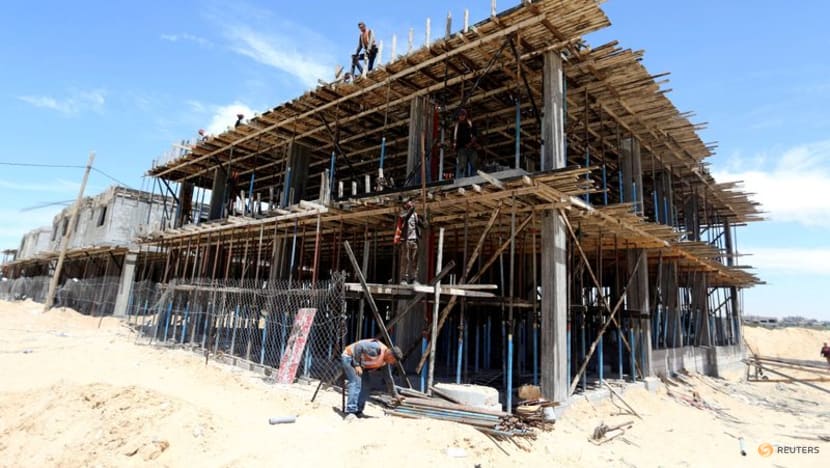Where does Hamas get its funding from? Crypto, taxation and investments, say experts
Questions remain over how funds enter the Gaza Strip, and who the beneficiaries are.

FILE PHOTO: Palestinian workers work in a Qatari-funded construction project in the southern Gaza Strip June 7, 2017. REUTERS/Ibraheem Abu Mustafa/File Photo

This audio is generated by an AI tool.
As the war between Israel and Hamas enters its second month, the militant group's sources of funding are coming under closer scrutiny.
The United States has signalled its intent to impose fresh sanctions targeting not just Hamas members, but also those affiliated to the group.
Behind Hamas lies a complex financial web that draws from taxing Palestinians, and a vast investment portfolio with assets spread across several countries in the region.
Key international donors, including countries such as Iran and Qatar, also contribute to Hamas’ budget.
Mr Stephen Reimer, a senior research fellow at London-based defence and security think tank the Royal United Services Institute, told CNA’s Asia Tonight on Wednesday (Nov 10) that Hamas’ highly sophisticated financial support network means its war chest will likely be funded beyond the current conflict.
WHERE DOES THE MONEY COME FROM?
Large amounts of donations have been made to Hamas in the form of cryptocurrencies so as to evade international sanctions, according to reports.
As cryptocurrency transactions are difficult to track, there have been varying estimates of just how much money has been raised through such means.
Research by blockchain analytics firm Elliptic showed that Hamas had potentially received more than US$7.3 million worth of crypto by July 2021, holding funds in Bitcoin, Tether stablecoin, Ether, Dogecoin and other cryptoassets.
Israeli authorities have been seeking to sever this financial link. According to news agency Reuters, Israel seized almost 190 crypto accounts it said were linked to Hamas, between December 2021 and April this year.
The bulk of Hamas’ funds, however, comes from “taxation and extortion of everyday economic activity”, which include taxing humanitarian aid, as well as the investment portfolio that the group has been able to generate and maintain over the years, said Mr Reimer, who specialises in financial crime and security studies.
INTERNATIONAL DONORS
The US State Department estimates Iran has provided as much as US$120 million to Palestinian militant groups, including Hamas.
Qatar has also openly voiced its role in facilitating cash transfers to residents in Gaza.
Doha’s funds have in recent years passed through Israel to the enclave, according to Reuters reports quoting sources familiar with the process. They are transferred electronically to Israel from Qatar, and then hand carried across the border by Israeli and United Nations officials.
Qatar said the money is directly distributed to poor families and paid as salaries to civil servants, in coordination with Israel, the UN and the US.
Observers said, however, that some of that money have made their way to the militant group.
Criticism has been directed at Prime Minister Benjamin Netanyahu’s government, with many pointing to Hamas' financial machine as a crucial launchpad for its deadly Oct 7 attack.
Some reports also indicate Hamas' top leaders amassing considerable fortunes with funds gained illicitly, while civilians on the ground live in a humanitarian crisis.
“This investment network is directed by the highest levels of Hamas leadership and has allowed Hamas senior officials to live in luxury while ordinary Palestinians in Gaza struggle in harsh living and economic conditions,” the US Treasury said last month.
US SANCTIONS
The US Treasury in October imposed sanctions on 10 key Hamas group members, operatives, and financial facilitators in Gaza and elsewhere, including Sudan, Türkiye, Algeria and Qatar.
Mr Reimer said: “The US sanctions against financial facilitators in (multiple) countries have pointed out how vast and highly sophisticated this network is.”
However, with the scale of Israel’s campaign aimed at destroying the militant group, Hamas’ control of the Gaza Strip – its main source of financing – is likely to be greatly diminished in the conflict, he said.
“If Hamas is no longer the de facto authority, that will reduce Hamas’ ability to generate revenue … which could force it to become more of a guerrilla-type organisation,” said Mr Reimer.
While the US is pressing allies to also toughen measures, there has been concerns that increased sanctions could impact humanitarian aid to Gaza’s residents.
AID DILEMMA
On October 19, a resolution by the European Parliament called for humanitarian assistance to be stepped up for Palestinians, while also highlighting the fear of the abuse of aid funds.
It urged the European Commission “to initiate a thorough review of all European Union financial assistance” to Palestinian territories and the region, “in order to ensure that no EU funds directly or indirectly financed any terrorist organisation”.
“There's been plenty of discussion about competing priorities between delivering humanitarian aid to Gaza — which is absolutely essential — and concerns about aid and funds being syphoned off by Hamas, particularly its military wing the al Qassam Brigades,” Mr Reimer said.
Targeting the group's investment portfolio would be more effective, he added, as the jurisdictions and stores of funds are far from the conflict zone.
“The conflict is hopefully going to shift our focus towards these financial facilitation networks, getting more countries on board and decreasing the tolerance that some countries have to allow this activity to occur on their soil,” he said.
However, he emphasised that aid needs to continue flowing into the besieged enclave.
“We're in a situation where we have to accept that some of this diversion of humanitarian aid and funds (to Hamas) is tolerable because the alternative – to not allow humanitarian aid into the strip – leaves us in a no better position, whereby civilians are left to suffer,” he said.
“This will only push them further into the embrace of extremist groups such as Hamas.”
















